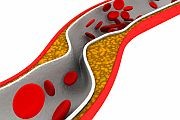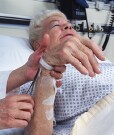Gender Differences in Receipt of End-of-Life Care
Male patients more likely to receive ICU care; males with EoL discussion less likely to have ICU stay
Proper Analysis Over Intuition for Avoiding Improper Antibiotic Use
Identifying illness correctly is key to drugs' effectiveness, researcher says
Support Groups for At-Home Walking Benefit PAD Patients
Patients with peripheral artery disease benefit from organized exercise program
Hospital Stays Longer Without Prophylactic Laxatives
Findings among elderly congestive heart failure patients taking laxatives at home
High-Value Care Advice Provided for Cancer Screening
Review of guidelines and evidence provides advice for screening for five common types of cancer
Statins, Fibrates Linked to 30% Lower Stroke Risk in Elderly
But no association between statins and lower risk of coronary heart disease in this group
Recommendations Developed for Responding to ICU Tx Requests
Multisociety recommendations on responding to requests for potentially inappropriate tx in ICU
Most Distinctive Causes of Death Mapped by U.S. State
Map depicts variety of causes, including 15,000 HIV deaths in Florida, 22 syphilis deaths in Louisiana
ATS: Aspirin Use Linked to Slower Progression of Emphysema
Slower progression of percent emphysema on CT after adjustment for multiple variables
ATS: Sleep Apnea May Boost Depression Risk in Men
Researcher says cause and effect can't be proved, but link between the two conditions is strong



















